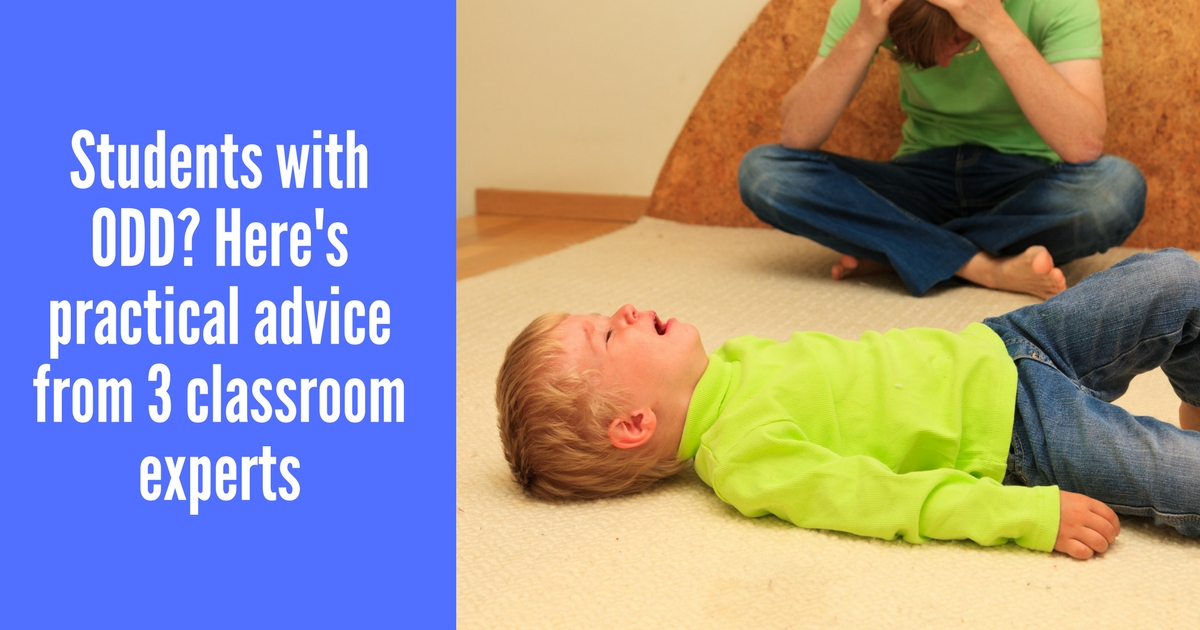The classroom management of ODD pupils can’t be left to chance.
If you have a child with ODD in your classroom:
- you need a joined-up set of strategies proven to manage their specific behaviours successfully
- you need them from day one
Learning from your mistakes is not the way to go.
Children with Oppositional Defiant Disorder actively seek out confrontation, are quick to argue and actively disobey adults.
If we fall into the trap of managing pupils with ODD in the traditional way – with simple systems of classroom rewards and consequences – we may actually be encouraging inappropriate behaviour.
If you want success, you need the right approach from day one.
A change of approach
Dr. Liz Bragg, from the Royal College of Paediatrics, explains that:
“ODD is often considered to be extreme behaviour, for example excessive arguing, throwing temper tantrums and blaming others for your mistakes.”
(If you’re interested in identifying students with ODD, this brilliant infographic will help you.)
That means we need a smarter approach to managing children with ODD.
We want to:
- be responsive to the pupil’s need for control
- help them learn that actions have consequences
- help them accept a person in authority telling them ‘no’
Here’s advice from three experts about how to do exactly that in your classroom.
Understand you’re not the cause of the defiance – you’re just an outlet for it
It’s very easy to take the behaviour of children with ODD personally.
Don’t.
The first step to managing their behaviour is to understand that it’s directed at authority figures in general.
In her article Oppositional Defiant Disorder in Children, Leah Davies, M.Ed., explains that children with the condition haven’t developed the coping strategies for dealing with frustration you’d expect in their classmates.
That has an impact on how we need to manage students with ODD in the classroom.
Dr. Davis has translated these difficulties into 25 key points for teachers to consider.
Here are the 5 we think are most important:
- Recognise that your normal classroom management techniques are likely to be ineffective. The child will misbehave just to get a reaction. This changes the game.
- Focus on a small numbers of behaviours at a time and work on those. Decide on which behaviours are affecting the student the most and focus on those.
- Avoid direct praise. The child’s instincts are to do the opposite of what you say. If you congratulate them for working quietly, you’re encouraging them to start shouting out, singing or worse.
- Instead, acknowledge progress by giving quiet feedback to the child. Try expressing this as an impartial measure of improvement (for instance, your noise level today is A+).
- Work hard to be clear and consistent. The child needs this to learn and improve in the long-term.
You can read the rest of the points in her article.
Don’t avoid consequences
Victoria Trix at Brighthub Education reminds us that the pupil is not acting inappropriately just to make you (and the rest of the class) miserable.
Their behaviour is due to their lack of resilience and inability to deal with frustration.
However, while we need to be reactive and flexible when teaching children with ODD, the student has to learn that actions have consequences.
Victoria goes on to say:
- the consequence must be something the child wishes to avoid
- that means you may need to deviate from the school’s behaviour policy…
- …which will involve the discretion/support of school management and the SENCO
Remember, giving (or even talking about) a consequence to a child with ODD can result in fireworks.
So, before you do, be prepared. Ask yourself:
- is now the right time to talk about the sanction (or would it be better if I delayed the conversation until the student’s more receptive)?
- do I need additional adult support when I have that talk?
- if I delay that conversation, how do I reassure the rest of the class that I haven’t just ignored the student’s behaviour?
But discipline by itself isn’t the answer
In her article Deconstructing Oppositional Defiant Disorder, Mona Delahooke Ph.D., argues that the way to help children improve isn’t simply through extra rules and punishments.
The child is experiencing a strong emotion (frustration) that they’re finding hard to deal with. The threat detection system in the child’s brain is overacting to that frustration – leading to a fight-or-flight response.
To control this reaction, the student needs to:
- understand what is happening at a biological level (what happens during the fight-or-flight episode, why they’re having it)
- recognise how that feels in their own body
- think about the response in a different way
There’s lots of evidence to suggest that if we understand why our body is behaving in a certain way, we can consciously override its fight-or-flight system and react differently.
For instance, you can enjoy the thrill of a roller-coaster ride, because you know you’re not in a real life-or-death situation. You can consciously adjust your response to strong emotions (like frustration, anger or fear) depending on the situation you’re in.
You’re not a slave to your biology.
In the same way, the child can learn that their classroom frustrations don’t warrant a fight-or-flight response – and react more appropriately.
Next steps
Obviously, the earlier preventative work is put in place, the sooner you’ll see results in the classroom.
To make the best progress, children with Oppositional Defiant Disorder (and their families) will need access to therapy from medical professionals.
To get that quickly, teachers and schools need a way to identify children with behavioural special needs – conditions like Oppositional Defiant Disorder.
Our free SEN Guidebook is designed to help. It’ll help you link specific special needs (including autism, attachment disorder and ADHD) to classroom behaviours. Then you can get the right professionals involved, and a plan in place to support pupils quickly.
We think it’s so important we’ve made it available for free.

